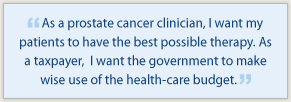 In the contentious debate over rising health-care spending, the cancer care policies of the British National Health Service (NHS) are often cited by U.S. policymakers as an example of how health-care rationing denies patients life-prolonging treatments based on costs. The ASCO Post recently spoke with prostate cancer specialist, Chris Parker, MD, Academic Urology Unit, The Royal Marsden NHS Foundation Trust, about the realities of oncology services in the United Kingdom.
In the contentious debate over rising health-care spending, the cancer care policies of the British National Health Service (NHS) are often cited by U.S. policymakers as an example of how health-care rationing denies patients life-prolonging treatments based on costs. The ASCO Post recently spoke with prostate cancer specialist, Chris Parker, MD, Academic Urology Unit, The Royal Marsden NHS Foundation Trust, about the realities of oncology services in the United Kingdom.
Active Surveillance
Most prostate cancer experts in the United States agree that active surveillance is underutilized in managing disease. Is this an issue in the United Kingdom?
Unlike the U.S., active surveillance is widely accepted by both doctors and their patients in the UK. Our latest data suggest that about 40% of men diagnosed with low-risk prostate cancer are managed by active surveillance.
The comparable figure in the U.S. is much less. It is difficult to understand why that discrepancy in treatment choices exists between the two nations; one factor could be a difference in patient attitudes. UK patients might place more emphasis on avoiding the side effects from prostate cancer treatment, while their counterparts in the US might be more focused on minimizing risk from the cancer.
Health-care Policy
The fee-for-service system in the U.S. provides doctors with an incentive to use expensive reimbursable treatments. Would you please contrast the UK’s system?
In the National Health Service, I receive a fixed salary no matter how many men with prostate cancer I treat or, for that matter, what modality of treatment they receive. I have no incentive to impose my treatment preference on patients, so they are free to make their own informed decisions. Maybe the decisions by our patients in the UK better reflect their own personal values rather than the prejudices of their physicians.
In our current debate on health-care spending, the UK’s National Health Service and National Institute for Health and Clinical Excellence (NICE) are often used as examples of health-care rationing that limits cancer care services. What’s your response?
I am a staunch supporter of the UK’s National Health Service and I would point out that medical services here are universally available to all people from whatever walk of life. No matter what your role in British society is, you are entitled to high-quality, timely medical care, which I believe is a huge strength of the UK system. It is taxpayer funded, free at the point of need. And to my mind, that makes a great deal of sense when you’re talking about a basic human need, such as health care.
In recent years we have had an abundance of new cancer drugs, and that can only be a good thing. However, the new drugs are increasingly costly and, for the most part, their benefits are measured in small increments. Taken together with the fact that our medical resources are finite, it seems obvious that we need some form of thoughtful rationing to ensure sustainability.
 To that end, NICE has an extremely difficult job in determining which drugs should be approved, and, in my view, they do it pretty well. As a prostate cancer clinician, I want my patients to have the best possible therapy. But as a taxpayer, I want the government to make wise use of the health-care budget. So I want NICE to approve cost-effective treatments, but I don’t want exorbitantly expensive treatments that offer very little in return.
To that end, NICE has an extremely difficult job in determining which drugs should be approved, and, in my view, they do it pretty well. As a prostate cancer clinician, I want my patients to have the best possible therapy. But as a taxpayer, I want the government to make wise use of the health-care budget. So I want NICE to approve cost-effective treatments, but I don’t want exorbitantly expensive treatments that offer very little in return.
NICE does have one shortcoming. Since the agency places great importance on making high-quality decisions based on an exhaustive review of the evidence, the decision-making process can be slow. This often leads to a significant delay in getting promising new drugs into the clinic. A topical example would be abiraterone for prostate cancer, which is now routinely available in the U.S. (as Zytiga) but not yet in the UK. I guess that is the price one pays for having such a rigorous examination process. Overall, I think NICE does an excellent job.
Prostate Cancer Overtreatment
Is there a central issue in prostate cancer that guides treatment decisions in the UK?
We know that certain men with prostate cancer benefit from curative treatment—especially those with high-risk disease. Conversely, we know that very few men with low-risk disease will benefit from treatment. A key unmet need is to better distinguish which men need treatment and which men do not. By doing so, we could not only deliver more cost-effective care, but also avoid the harms associated with unnecessary treatment.
Overtreatment of prostate cancer begins with screening. Some experts assert that prostate-specific antigen (PSA) testing leads to many unnecessary biopsies. What’s the UK experience with PSA?
The debate over the pros and cons of PSA screening is highly controversial. Those in favor of PSA screening point to the European Screening Trial that shows a reduction in the risk of prostate cancer death. Those who feel PSA does more harm than good cite data showing the huge problems of overdiagnosis and overtreatment. The take-up rate of PSA testing is certainly far lower than in the United States; only a small minority of UK men have their PSA checked on a regular basis.
Clinical Trials
What role do trials play in clinical practice in the UK?
We place a great deal of importance on clinical trials, and the UK system is conducive to patient participation in trials. The National Cancer Research Network (NCRN) provides centrally funded research nurses throughout the UK to facilitate clinical trials. The UK has a culture that promotes participation in clinical trials. My patients typically expect to be offered the chance to enroll in a trial. In fact, about 50% of patients with prostate cancer in our center are on trials.
One important UK prostate cancer trial is ProtecT, in which about 2,000 men have been randomly assigned to surgery, radiotherapy, or active monitoring. In time, this trial will yield the best-quality evidence concerning the relative merits of those three options. Without such well-constructed randomized trials, clinical decision-making will always be a matter of guesswork; these trials are the key to making progress in treating prostate cancer.
Closing Thoughts
Any last thoughts on the state of cancer care in the UK?
Cancer care in the UK is often criticized as inferior to that in other parts of the world. I beg to differ. NHS oncology services have improved considerably in recent years, and, in my experience, are now excellent. When it comes to prostate cancer, our outcomes are comparable to those anywhere in the world. My concern would be that the level of funding that the NHS currently enjoys might be threatened given the global economic malaise we are facing. ■
Disclosure: Dr. Parker reported no potential conflicts of interest.

